Welcome back to This Week in Apps, the weekly TechCrunch series that recaps the latest in mobile OS news, mobile applications and the overall app economy.
The app industry continues to grow, with a record number of downloads and consumer spending across both the iOS and Google Play stores combined in 2021, according to the latest year-end reports out this week. App Annie says global spending across iOS and Google Play is up to $135 billion in 2021, and that figure will likely be higher when its annual report, including third-party app stores in China, is released next year. Consumers also downloaded 10 billion more apps this year than in 2020, reaching nearly 140 billion in new installs, it found.
Apps aren’t just a way to pass idle hours — they’re also a big business. In 2019, mobile-first companies had a combined $544 billion valuation, 6.5x higher than those without a mobile focus. In 2020, investors poured $73 billion in capital into mobile companies — a figure that was up 27% year-over-year.
This Week in Apps offers a way to keep up with this fast-moving industry in one place with the latest from the world of apps, including news, updates, startup fundings, mergers and acquisitions, and suggestions about new apps and games to try, too.
Do you want This Week in Apps in your inbox every Saturday? Sign up here: techcrunch.com/newsletters
Top Stories
App economy in 2021 reaches $133-135 billion
This week, both Sensor Tower and App Annie released their year-end estimates on the app economy in 2021. Sensor Tower is forecasting that, by the end of the year, Apple’s App Store and Google Play will see a combined record consumer spend of $133 billion and 143.6 billion downloads. Its report came out first and we covered it here on TechCrunch. Today, we’ve got App Annie’s report in our hands, too.
App Annie’s estimates come in slightly higher than Sensor Tower’s on consumer spend, but lower on downloads. App Annie says global consumers will spend a record $135 billion across the App Store and Google Play in 2021, up from $112 billion in 2020. However, it reports 140 billion new app installs, instead of 143.6 billion.
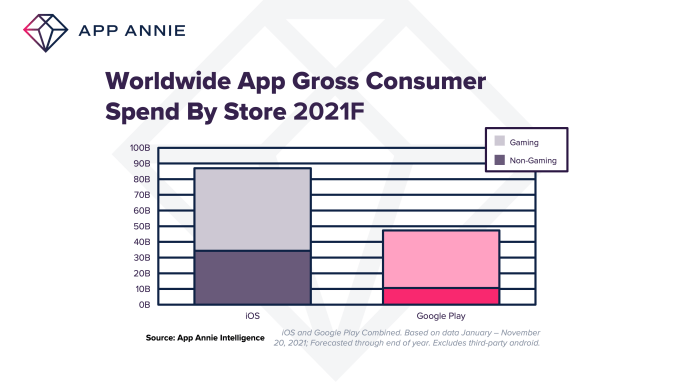
Image Credits: App Annie
The firm also found iOS spending continues to top Android spending. It notes that 65 cents in every app economy dollar is now spent by Apple users. And gamers spend the most. They will have contributed around 60% of the iOS revenue and nearly 80% of Google Play revenue in 2021. In total, gaming contributed around $90 billion of the total global spend in 2021.
App Annie also saw many of the same trends as Sensor Tower did, including the revenue growth in non-gaming categories, particularly entertainment and social apps — the former which is rising to $12 billion next year, or double that of 2020.
In terms of app downloads, India was the top market, contributing 20% of global downloads across both stores, followed by the U.S. (9%), then Brazil (8%).
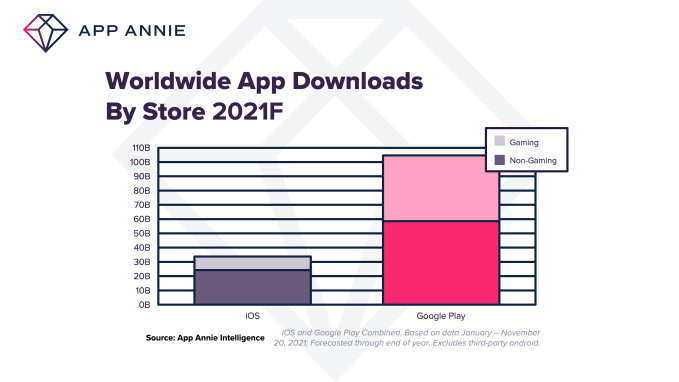
Image Credits: App Annie
App Annie selected TikTok as a top “breakout” app for consumer spending the year. (It’s No. 2 on App Annie’s “breakout” chart that ranks the apps that saw the biggest change in the past 12 months.) But TikTok is also influencing other apps. For example, a video editing app called CapCut — a popular TikTok editing tool — was the No. 1 breakout app by downloads.
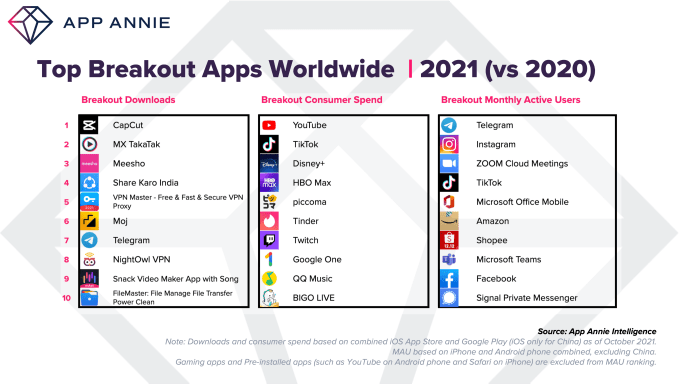
Image Credits: App Annie
App Annie’s report focuses more on “breakout” apps and games rather than the traditional top apps by downloads and consumer spending. It’s an interesting way to view the data as it points to more newcomers and fast risers, but it doesn’t tell you which were the “biggest” apps of the year, necessarily. The full report is here.
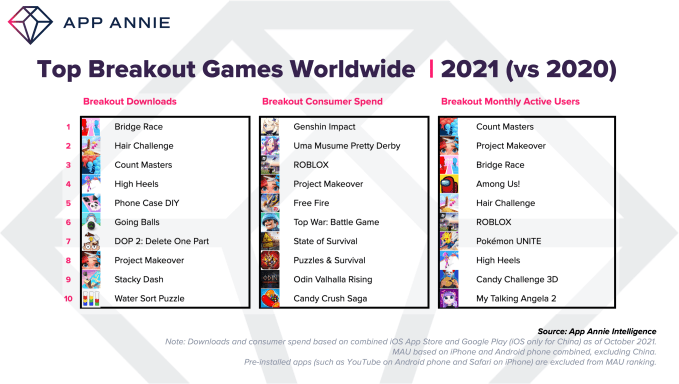
Image Credits: App Annie
Apple doesn’t have to change its App Store yet, court rules
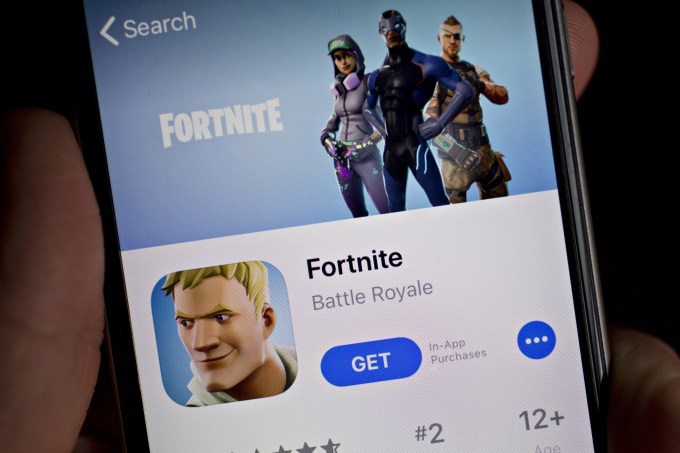
Image Credits: Andrew Harrer/Bloomberg / Getty Images
Apple will not have to implement changes to its in-app purchase system and App Store guidelines as ordered by the judge’s ruling in its court battle with Epic Games. Apple largely won that case, as the court ruled Apple was not acting as a monopolist. But the company had been ordered to stop preventing app developers from adding links that pointed users to other means of paying for their in-app purchases outside the App Store. Both Apple and Epic appealed the original ruling — Epic because it was not successful with its larger antitrust claims, and Apple because it disagreed with this aspect of the ruling over in-app purchases.
Apple originally had until December 9 to update its App Store policies, but had asked the court for a stay on the injunction regarding the changes to its in-app purchasing guidelines until the appeal was decided. Apple had tried to argue its case for a stay before but the lower court denied the motion. Its latest attempt, however, was granted by the U.S. Court of Appels for the Ninth Circuit after Apple argued, among other things, that it would have to come up with a whole new system to commission purchases that took place outside the App Store. Yep, that’s right — Apple doesn’t think that allowing app developers to point to their own websites for payments means it can’t still take a cut. (After all, isn’t that what Google decided to do in South Korea?)
In any event, Apple successfully argued this would cause “irreparable harm” as Apple wouldn’t get back the money, time and resources it spent on this new system if the appeal came through in its favor. As a result, Apple won’t have to make any changes until the appeals court has heard the case.
Instagram goes to Congress

(Photo by BRENDAN SMIALOWSKI/AFP via Getty Images)
Instagram head Adam Mosseri testified before Congress for the first time Wednesday to defend the app’s teen safety track record. Senators were not impressed with the 3 AM release of promised teen safety features the night before the testimony as some sort of last-minute effort to look like the company had plans to fix its systems. There was a sense of frustration in asking Mosseri many of the same questions that had been asked to other Meta execs over the past couple of years, Sen. Blackburn (R-TN) noted, saying “I feel like the conversation repeats itself ad nauseam. Nothing changes — nothing.”
Mosseri denied that research showed Instagram’s products were addictive and said the company had put into place protections and age-approrpriate experiences for minor ages 13-17 on the app. But Blackburn’s office had discovered teens’ accounts still defaulted to public rather than private when created on the web. Mosseri also used the hearing to propose a new industry body that would create a series of best practices for apps around things like age verification, parental controls and product designs for teens and kids.
Social media algorithms got a beating during the hearing as well, and Mosseri revealed Instagram was planning to bring back the chronological feed next year.
Weekly News
Platforms: Apple
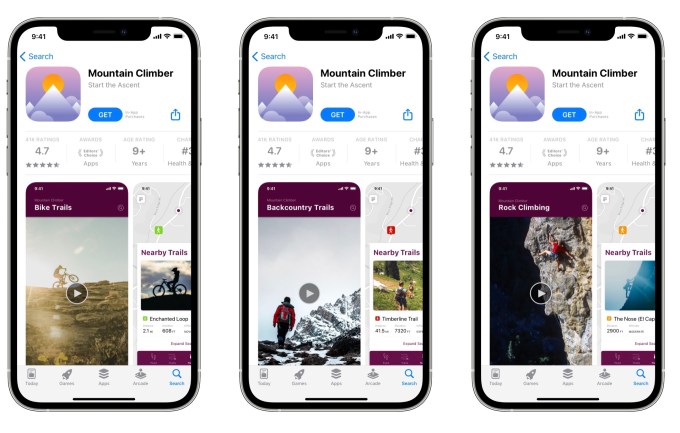
Image Credits: Apple
- Apple introduced two new features for App Store product pages to help developers improve their listings. Product page optimization will allow developers to try out alternate versions of their product pages with different icons, screenshots and app previews to see which one gets the best results. These A/B tests will show the different pages to a randomly selected percentage of App Store users and the results will appear in App Analytics. Also new are custom product pages, which let developers create additional versions of their product page to highlight specific features or content, each with their own, unique URLs. This could allow developers to create pages that they link to from ads that highlight a particular character, gameplay, activity/sport or other in-app features.
- Apple announced price changes on the App Store in Turkey, which tend to come about due to changes in taxes or foreign exchange fees. As a result, prices on apps and IAPs will increase in Turkey, it said.
- Apple seeded the iOS 15.2 Release Candidate to developers. The upcoming version of iOS will introduce the Siri-controlled Voice Plan for $4.99/mo; the App Privacy Report feature in Setting; the minor safety feature which warns parents of iMessage texts containing nudity; expanded Legacy contacts; macro photo control; and other features. RC versions of tvOS 15.2 and watchOS 8.3 are also here, as is the macOS 12.1 RC which is still lacking the anticipated Universal Control feature.
- Apple partnered with Boys & Girls Clubs of America on a new coding program that will teach the basics of app design and development using Apple’s “Everyone Can Code” curriculum. The program will be available in Atlanta, Austin, Miami-Dade, Wake County (home to Raleigh and Apple’s new HQ) and Silicon Valley, as well as Atlantic City, Chicago, Detroit, Nashville and Newark, where it’s already live.
Platforms: Google
- Google released the first version of its Android 12L beta designed for large-screened tablets and foldable devices. The beta works on Pixel, Google’s Android Emulator and other eligible devices.
- Google says it’s working on a fix that prevented some Android users from calling 911. The bug only impacted users who had Microsoft Teams installed but weren’t logged in. The company said a limited number of users were impacted and it had to do with “unintended interaction” between the Teams app and the underlying Android OS. Both Microsoft and Google are prioritizing a fix.
- Google announced it’s bringing Android games to Windows users in 2022 with the coming launch of Google Play Games app for the PC.The app will allow users to play and resume games on a desktop PC after first playing them on a phone, tablet or Chromebook.
- Google’s Pixel Android phones rolled out the new “Quick Tap to Snap” feature announced earlier this year, which lets users open Snapchat directly from their lockscreen. The functionality will be exclusive to Pixel 4a 5G and newer devices. There’s also a new “Pixel Face” exclusive filter for these Android owners.
- Google Play is making it easier for users to update the Google Play app itself. A new, more prominent button will make it more obvious there’s a way to check for updates of the Play Store app.
E-commerce and Food Delivery
- eBay introduced a new feature that lets sellers scan the shoes and sneakers they’re selling to create an interactive “3D” view which buyers can view when shopping from the eBay app on iOS and Android. The company worked with Unity on the new feature that will begin to roll out this month to select sellers before a broader launch next year.
- Alcohol delivery app Drizly added a feature that lets you scan the barcode on any alcohol drink you come across in order to gift it to a friend for the holidays. The “Drink Scanner” is available in the iOS and Android app’s latest update.
- Instagram is running a series of live shopping events on its app from December 7-15 featuring creators and personalities like Nia Sioux and Lisa Rinna, among others, as part of its live shopping push.
- DoorDash launched “ultra-fast” delivery in New York where deliveries from local DashMarts arrive in 15 minutes or less. The feature will expand to more NYC locations and elsewhere in the future.
- TikTok has rolled out a new app called TikTok Seller in Indonesia, which lets sellers manage their TikTok Shops via their smartphone. The country is often a testing ground for new e-commerce features, noted TikTok.
Augmented Reality
- Snap hosted its annual Lens Fest, giving reporters a first look at its newest AR-enabled glasses, Spectacles, while also sharing other new features and updates. The company announced updates to its AR lenses creation platform, Lens Studio, which is now gaining a new Sounds library; support for real-world physics that make AR elements react more realistically; broader support for World Mesh (making experiences that feel more a part of the real world), which was previously available only on high-end phones; a new API library for real-time data (stocks, weather, etc.); and soon, custom land makers, which will turn local landmarks into AR attractions.
- Snap also introduced a new Lens Call-To-Action feature that lets creators include a link within a Lens, so they can drive Snapchat users to a destination like a shop
- Snap’s Spectacles AR Lenses allow users to learn, shop, experience art, play games and more, but are still in a development mode. (Clearly! Unlike Facebook’s smart (non-AR) glasses built by Ray-Ban, which look fairly normal, CNET described Spectacles as “a real-life version of the ‘deal with it’ sunglasses.”)
- Niantic’s Pokémon GO adds a feature that encourages users to AR scan nearby landmarks. This user-generated data will help the company build out its concept of the “real-world metaverse,” powered by its AR dev kit, Lightship. To work, players visit PokéStops, which represent real-world places, and then tap a button and walk around the area to allow the camera to capture the data.
Fintech and Crypto
- WhatsApp launched a cryptocurrency pilot in the U.S. Meta announced it will begin testing cryptocurrency payments on the WhatsApp platform. Novi head Stephane Kasriel, who runs the digital wallet for the company, announced the news on Twitter, noting the payments would appear in chats and messages during a trial run of the integration here in the U.S. Money added to Novi is converted to Pax Dollar (USDP), a stablecoin tied to the U.S. dollar and issued by Paxos. Users can keep the money in their Novi account or withdraw it to their bank account.
Social
- Twitter is the latest to test a TikTok-like vertical video feed in its app. The company is trying out a video feed on its “Explore” page in the app, which even has its own For You tab, like TikTok. The feature is being tested in English with select users on iOS and Android.
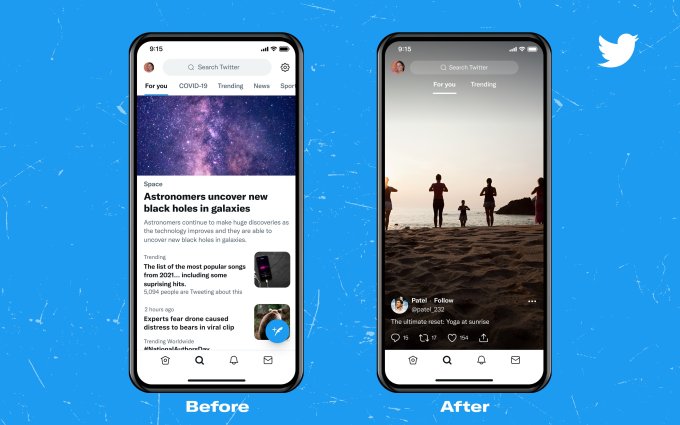
Image Credits: Twitter
- Twitter also rolled out a new system for identifying platform problems. The company says it will use data from the tweets reported by users that will no longer ask the user to figure out which rule the tweet is breaking — the automated system will do this instead. The user can then accept the suggestion or say it isn’t right — the latter which could give Twitter more information about the types of harmful activity happening on the platform which may fall into grayer areas. This could help guide Twitter policy changes. The system is being tested with a small group of U.S. users ahead of a 2022 launch.
- Meta (Facebook) rolled out a suite of new features for creators this week, including an online store for buying “Stars” to tip creators on the web (where Meta doesn’t have to pay app store commissions) and over a dozen new features and discovery tools for Facebook Live creators, including support for links, more co-hosts, new posting formats and much more. It also introduced a new “Professional” mode for Facebook profiles aimed at creators and new moderation and customer support tools and services.
- Reddit took a cue from Spotify’s popular year-end review feature, Wrapped, with the introduction of its own year-end feature, Reddit Recap. The recap includes a summary of the time spent on the platform, a look at the content that you interacted with or contributed, topics you engaged with and communities you viewed or joined. Reddit users will be able to hide their username and avatar when sharing the recap across other social media apps.
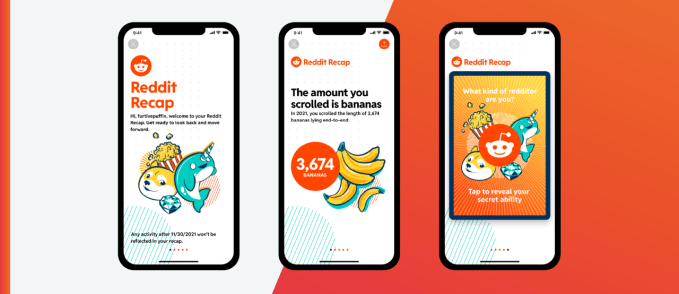
Image Credits: Reddit
- TikTok shared its year-end list of the top TikTok trends, moments and videos of 2021, in the U.S. and globally, as well as which songs and artists were hits on the platform. The company will also be the presenting sponsor of VidCon U.S. 2022, taking over from YouTube.
- Facebook and Instagram also rolled out their “Year in Review” features, which let people look back and reshare their highlights. On Facebook, this is a personalized “Year Together” card that highlights the friends, places and feelings that mattered the most. Instagram, meanwhile, offers a “Playback” time capsule that leverages their Story archive.
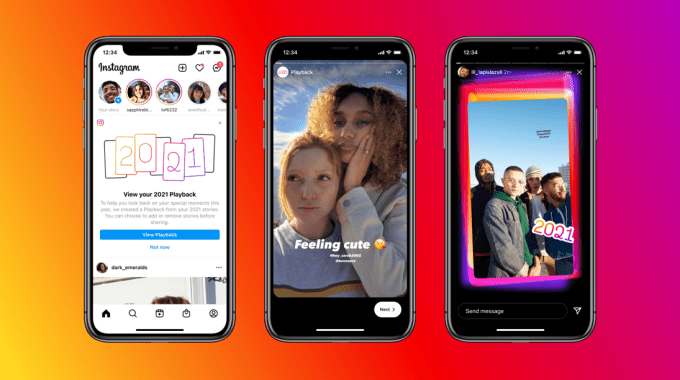
Image Credits: Instagram
Photos
- Google is rolling out the “Locked Folder” feature to non-Pixel Android devices. The feature gives users a way to lock private photos behind a passcode or biometric authentication. Reports say it’s been arriving on Android devices made by Oppo, OnePlus and Samsung.
Messaging
- Meta (Facebook)’s Messenger head Stan Chudnovsky said he will depart the company next year. The exec is the latest in a string of departures which have also included head of Facebook app Fidji Simo, now Instacart CEO; former head of Facebook Marketplace, Deborah Liu, now CEO of Ancestry.com; former Chief Revenue Officer David Fischer; Novi division co-founder Kevin Weil; VR exec Hugo Barra; 10-year veteran and former ads chief Carolyn Everson (who reportedly grew tired of running interference for Facebook during its controversies); 13-year veteran and CTO Mike Schroepfer; and recently, head of Facebook’s cryptocurrency efforts, David Marcus and head of Facebook Workplace, Julien Codorniou.
- The Messenger Kids app is rolling out new features, including support for a dark mode and voice effects for audio messages (like robot, ghost, gorilla or mouse and more), as well as the ability to start games from within the chat thread. The features will arrive on iOS first.
- WhatsApp introduced a new feature that allows users to set all their messages to disappear by default after either 24 hours or 90 days, in addition to the seven-day period announced last year.
Dating
- Tinder offered a look back at 2021 with its “Year in Swipe.” The company shared silly metrics like a 40% increase in the side-eye emoji in bios in the year, as well as more interesting ones, like a 52% increase in mentions of “video call” in bios, and 20% increase in “close by” and “nearby” in bios, indicating a desire to connect in real life. Users also prompted they were vaxxed (bio mentions grew by over 3x) and vax badges were the most popular badge among Gen Z users.
- Tinder also partnered with Spotify on a new “Music Mode” feature that allows users to hear a 30-second looped preview of a match’s chosen song when checking out their profile.
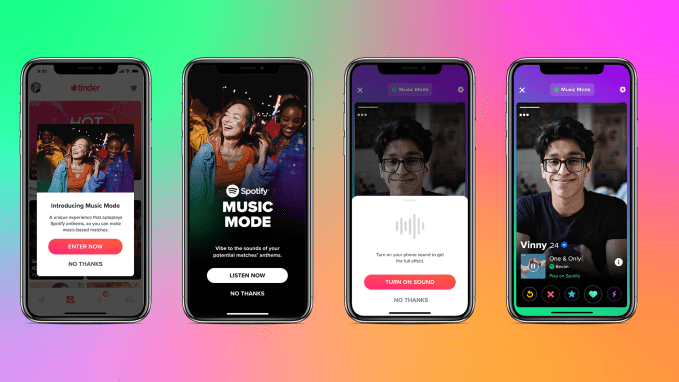
Image Credits: Tinder
Streaming & Entertainment
- ViacomCBS is partnering with Wattpad, an app hosting an original stories community whose projects are often adapted into books, TV and film by major companies, including Netflix, Hulu and others. ViacomCBS says it will work with Wattpad and sister company Webtoon, both now owned by Naver, to develop original content for its sites and networks, including the Paramount+ streaming service.
- Discord rolled out a pilot of premium memberships, a new creator monetization feature that lets community members pay for subscriber-only content.
- Twitter’s live audio rooms, Twitter Spaces, can now be recorded for later listening. The feature works on iOS, Android and now the web, too.
- YouTube Premium subscribers now have access to Listening Controls, which replaces everything under the video window (like comments and other video suggestions) with dedicated controls for play/pause/next/previous buttons and other options, like saving to a playlist or controlling playback speed.
- YouTube Music offered its own attempt at something like Spotify’s Wrapped with the launch of its 2021 Recap landing page in the YouTube Music app which lets users see personalized stats, like top artists, songs, videos and playlists of the year. The app also added its own top hits of 2021 playlists.
Gaming
- Netflix again expanded its mobile gaming lineup with three more casual gaming titles, “Dominoes Cafe,” “Knittens” and “Wonderputt Forever,” and says it has two more coming soon, a rhythm game, “Haxtech Mayhem,” and a card strategy game, “Arcanium: Rise of Akhan.” The company now has a gaming catalog of at least 10 games.
- Facebook Gaming added a new “Play with Streamer” feature that lets viewers hop into games with their favorite creators. The feature is launching with Pac-Man Community, a multiplayer version of the classic that viewers can click to join to play along. Another game with the option is Worlds FRVR, a Minecraft clone.
- WildWorks, makers of mobile games like Animal Jam and Feral, is in hot water with a group of core fans over its announcement it would move into crypto gaming. The fans are opposed, largely philosophically, to crypto technologies and aren’t happy the company is reusing assets from the game Feral to build the new NFT gaming experience when Feral isn’t even finished or bug-free. The debate got so heated, some WildWorks employees moderating the Discord had to step back for their own mental health after threats, vulgarity and hate were directed at them.

Image Credits: WildWorks’ Cinder
Government & Policy
- A report by The Information revealed Apple CEO Tim Cook signed a five-year agreement with Chinese officials which committed Apple to doing its part to help develop China’s economy and progress through investments, business deals and worker training, to help better its ties with the Chinese government — which has not yet retailed against Apple, despite U.S. sanctions on Chinese companies, like Huawei.
- The U.S. Justice Dept.’s antitrust investigation of Apple is now exploring how Apple’s treatment of Roblox seems to differ from how it’s treating Fortnite, owned by Epic Games (which is appealing its own antitrust lawsuit). Roblox had changed its website and app to replace the word “games” with “experiences” after an Apple exec said in court that Apple wouldn’t consider Roblox a game.
- Apple sued Russia’s Federal Antimonopoly Service over a warning it received about its App Store related to the anti-steering clause in its App Store policies, which says developers can’t inform customers in-app or through emails about other ways to pay for goods and services beyond the app, which Russia has determined to be market abuse. Apple had failed to comply with the changes requested, which could see it facing fines.
- Ireland’s data protection regulator, the DPC, announced a draft decision sent to other EU DPAs in relation to a Global Data Protection Regulation (GDPR) investigation over Instagram’s handling of children’s data. It could still be more than half a year before any final decision on the complaint is made.
- China ordered the app stores to remove 106 more smartphone apps, including the social networking app Douban and karaoke app Changba, over data privacy and security violations.
Security & Privacy
- A report by The Markup details how Tile’s new owner, family communication app Life360, is a large location data broker that sells data to Cuebiq, Allstate’s Arity, SafeGraph and X-Mode. (The first two are disclosed in the app’s privacy policy.) Data brokers resell the information gathered from apps to other customers, like hedge funds or for use in targeted advertising. However, X-Mode has sold to the U.S. DoD and SafeGraph has sold to the CDC in the past. Life360 as of last year had a policy against selling data to government agencies, however. The company says its contracts probit re-identifying individuals, after it anonymizes their data. Two former employees confirmed Life360 takes precautions to remove location histories from individuals, but said it doesn’t further fuzz, hash or aggregate or reduce the precision of the location data, as it should. The app doesn’t sell data on users under 13, per COPPA guidelines. It offers an opt-out of data sharing on its Permissions screen and the company says “millions” of its customers have used that option.
- The FT (via Ars Technica) reports that Apple has allowed companies like Facebook and Snap to continue tracking user data from those who have asked the apps “not to track” them as long as the data is anonymized and aggregated instead of being tied to specific user profiles. This allows companies to target ads at a cohort level, which some argue is a looser interpretation of the “do not track” rules.
- Verizon’s network is collecting data about some users’ browsing history, location, apps and contacts, according to a report by Input. The data is shared unless the customer opts out from the setting in the My Verizon app.
Funding and M&A
 Twitter acquired Quill, a would-be Slack rival, whose team will now be refocused on improving Twitter’s DM (messaging) product. Deal terms were not disclosed but the company had raised $16 million to date. Some were not happy with the fast shutdown, given they were running their businesses on Quill’s system.
Twitter acquired Quill, a would-be Slack rival, whose team will now be refocused on improving Twitter’s DM (messaging) product. Deal terms were not disclosed but the company had raised $16 million to date. Some were not happy with the fast shutdown, given they were running their businesses on Quill’s system.
 Singapore startup Upmesh raised $7.5 million in a pre-Series A round led by Monk’s Hill Ventures, and launched its first Instagram live selling app for merchants and backend automation features for live commerce.
Singapore startup Upmesh raised $7.5 million in a pre-Series A round led by Monk’s Hill Ventures, and launched its first Instagram live selling app for merchants and backend automation features for live commerce.
 Indonesian fintech Flip, an app focused on making interbank transfers easier, raised $48 million in Series B funding led by Sequoia Capital India, Insight Partners and Insignia Ventures Partners. The company will use the funds to expand its business in the market, improve the tech and grow its team.
Indonesian fintech Flip, an app focused on making interbank transfers easier, raised $48 million in Series B funding led by Sequoia Capital India, Insight Partners and Insignia Ventures Partners. The company will use the funds to expand its business in the market, improve the tech and grow its team.
 French fintech and super app Lydia raised $100 million in Series C funding, valuing the business at over $1 billion. New investors include Dragoneer and Echo Street, joining Tencent, Accel and Founders Future.
French fintech and super app Lydia raised $100 million in Series C funding, valuing the business at over $1 billion. New investors include Dragoneer and Echo Street, joining Tencent, Accel and Founders Future.
 Cerebral, a startup offering app-based mental health services, raised $300 million in funding in a round led by SoftBank Vision Fund 2, valuing the business at $4.8 billion. Gymnastics champion Simone Biles is also an investor to the app, which has offered care to over 200,000 patients since January 2020.
Cerebral, a startup offering app-based mental health services, raised $300 million in funding in a round led by SoftBank Vision Fund 2, valuing the business at $4.8 billion. Gymnastics champion Simone Biles is also an investor to the app, which has offered care to over 200,000 patients since January 2020.
 U.S. mobile bank MAJORITY, aimed at immigrants, raised $27 million in Series A funding led by Valar Ventures. The company lets users sign up for a bank account without an SSN — instead, they can use a government ID for any other country alongside proof of a U.S. address. In addition to mobile bank services and a Visa debit card, the app offers culturally specific features like discounts at local businesses.
U.S. mobile bank MAJORITY, aimed at immigrants, raised $27 million in Series A funding led by Valar Ventures. The company lets users sign up for a bank account without an SSN — instead, they can use a government ID for any other country alongside proof of a U.S. address. In addition to mobile bank services and a Visa debit card, the app offers culturally specific features like discounts at local businesses.
 Banking app Nearside, aimed at SMBs, raised $58 million in Series B funding led by Valar Ventures. The bank offers checking accounts with no fees, a Mastercard debit card and cashback rewards. The startup, previously known as Hatch, notes its userbase has grown 800% since its Series A just 7 months ago.
Banking app Nearside, aimed at SMBs, raised $58 million in Series B funding led by Valar Ventures. The bank offers checking accounts with no fees, a Mastercard debit card and cashback rewards. The startup, previously known as Hatch, notes its userbase has grown 800% since its Series A just 7 months ago.
 Jordan-based mobile game publisher Tamatem raised $11 million in Series B funding led by KRAFTON, the South Korean game developer behind PUBG, marking its first investment in the Middle East and North Africa (MENA). Tamatem has published more than 50 games since 2013, including VIP Baloot, VIP Jalsat, Fashion Queen and Clash of Empire. It has over 120 million collective downloads across its portfolio and 3.5 millionM DAUs on its top games.
Jordan-based mobile game publisher Tamatem raised $11 million in Series B funding led by KRAFTON, the South Korean game developer behind PUBG, marking its first investment in the Middle East and North Africa (MENA). Tamatem has published more than 50 games since 2013, including VIP Baloot, VIP Jalsat, Fashion Queen and Clash of Empire. It has over 120 million collective downloads across its portfolio and 3.5 millionM DAUs on its top games.
 U.K.-based social audio app Wisdom raised $2 million in seed funding in a round led by First Round Capital. The company focused on offering life advice and mentorship, and says its users have now shared some 600,000 minutes of content.
U.K.-based social audio app Wisdom raised $2 million in seed funding in a round led by First Round Capital. The company focused on offering life advice and mentorship, and says its users have now shared some 600,000 minutes of content.
 Berlin-based instant grocery delivery app Flink raised $750 million in Series B funding led by strategic backer DoorDash for its service that runs in 60 cities around four countries, reaching 10 million customers.
Berlin-based instant grocery delivery app Flink raised $750 million in Series B funding led by strategic backer DoorDash for its service that runs in 60 cities around four countries, reaching 10 million customers.
Downloads
Holiday home screens are here (Updates)
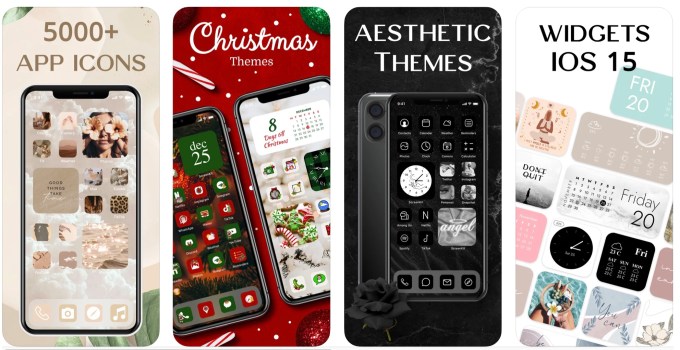
Image Credits: ScreenKit
Looking to decorate for the holidays?…Not your home, that is, but your phone?
A number of iOS home screen theming apps have rolled out holiday features, allowing users who celebrate to theme their icons, widgets and wallpapers to get into the Christmas spirit. Apps like Aesthetic Kit, Brass and ScreenKit have tons of Christmas Themes, which they’re promoting by way of those new App Store Events. If you come across an event, you can tap it to launch directly into the Christmas section of the app you have installed. If you’re not into Christmas, the winter themes could be another good look for this time of year. In addition to the iOS home screen apps, other apps focused on motivational quote widgets, like Motivation and I Am, among others, have also added selections of Christmas-themed quotes and affirmations (great for those trying to survive a trip home to see the fam, perhaps!).
More companies are embracing the iOS home screen customization trend, which has remained popular since the launch of the iOS 14 widgets. People figured out how to use Apple’s Shortcuts to update their icons’ look to match their widgets and wallpapers, creating a whole new category of apps as app makers emerged to simplify the process through the use of downloadable profiles that can install all your icon designs at once. (Apple, for now, turns a blind eye to the use of profiles for this purpose. But if Apple comes out later with its own version of Android’s Material You, well, who knows…).
Some apps also offer custom icons for their paying customers, but Twitter is taking things even further. Although its Twitter Blue subscription doesn’t just offer alternative icons, it’s making seasonally themed icons, too. Its winter collection is rolling out now.
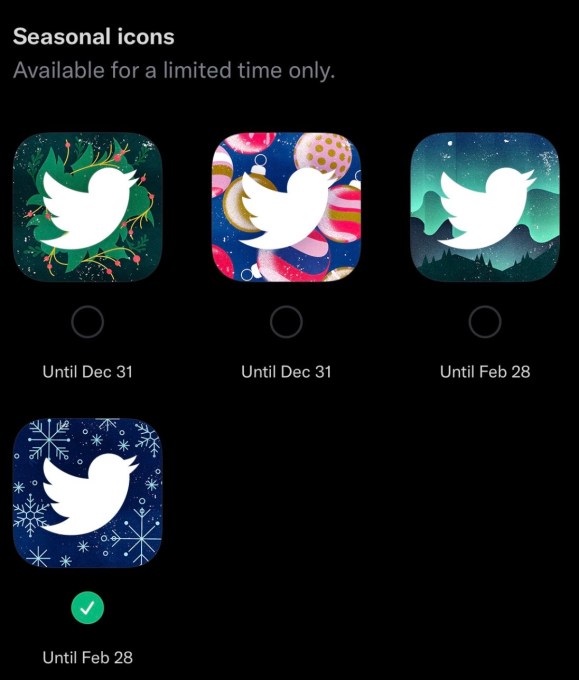
Image Credits: Twitter screenshot via @retromauro
uBrowser
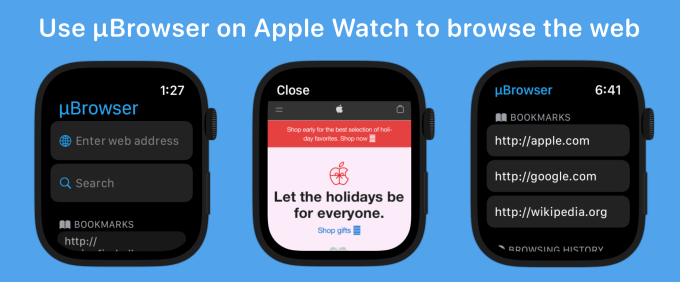
Image Credits: uBrowser
We’re still not ENTIRELY sure Apple meant to approve this one, so get it while you can? The new Apple Watch app, uBrowser, offers a limited mobile browser experience for Watch owners. It lets you create bookmarks, see your recently visited pages and search the web using DuckDuckGo, which means it’s…kinda like a real browser. Except, of course, many web pages can’t run on watchOS through the app — particularly JavaScript-heavy pages or those that would require video playback. Web pages that need a login won’t work either. The app uses the Authentication dialogue to open a website on watchOS (this is meant to allow users a way to provide their credentials to an app that requires web authentication.) The app also offers an iOS companion where you can manage your bookmarks.
Founder Arno Appenzeller says he began work on the app after seeing complaints that said the new Series 7 Watch needed a browser — and he agreed. He decided to see if his app would pass App Review, as other browser apps had. This was a risk as the other browser apps are different — the watchOS app Parrot requires an iPhone to be nearby and Lazer only supports a reader mode experience, for example. UBrowser was approved twice so far — once for launch and a second time for an update, so maybe it’s not a mistake! The app is 99 cents on the App Store.
from TechCrunch https://ift.tt/3pIppQG
via Tech Geeky Hub





No comments:
Post a Comment